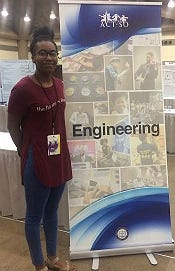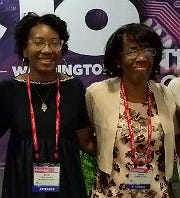Sarah Johnson is a black, female Gen Zer. How has being a "unicorn" influenced her journey into the engineering field?

The diversity conversation in the tech industry overwhelmingly revolves around gender and the need to bring more women into the field. It’s an important dialogue, and the initiatives springing up as a result are critical to the evolution of technology and the tech industry as a business.
But gender inequality, as dismal as the statistics are, pales in comparison to inequality in ethnic minorities in tech. Black and Hispanic workers are underrepresented in the channel when compared to private industry as a whole by about one-half, and occupy only 2 percent and 3 percent, respectively, of executive, senior official and management positions.
We’re beginning to address racial inequality more, but what about when gender and race intersect? For women of color in technology, the double whammy can cripple confidence and stall careers. It also causes confusion in the recipient of bias: Is the discrimination a result of gender? Of race? Is it a result of overt sexism or racism, or is it a lack of understanding of certain characteristics that develop from being a minority in America, which is an experience that the predominant straight white male demographic in tech will never be able to understand?
There’s a new generation changing the way the channel thinks and talks about racial and gender diversity. No, I’m not talking about millennials, though they have and will continue to influence diversity in tech for the better. Generation Z, sometimes called the centennials because their generation starts roughly around the turn of the century, is the most technologically savvy generation we’ve ever seen. They’ve never known a world without constant connectivity, social media and easy access to information.
They also have strong feelings about social justice and different views on racial and gender equality than previous generations. As children, they saw the United States elect its first African-American president. Social advances such as gay marriage seem like a given to them. Many of the debates Generation X and millennials have around equality are conversations that just don’t exist for many Gen Zers. The James Damore memo of last summer, for example, isn’t something that would probably gain traction with Gen Z. If the millennial generation began to move the needle on diversity in the channel, it’s Gen Z that will normalize a bias-free workplace.
At CompTIA’s annual ChannelCon conference last month, its Advancing Women in Technology community awarded 18-year-old Sarah E. Johnson the group’s first scholarship. As a woman and an African-American, she already knows that she’ll have to work harder to make an impression in technology. We sat down with Johnson to talk about home-schooling, hardware and how being a black woman in tech and engineering has influenced her thinking.
The following transcript has been edited for length and clarity.
Channel Futures: You’re like this unicorn in the channel. You are a woman. You are an African-American. You are Gen Z. Do people take you more or less seriously because of these labels?
Sarah Johnson: I’ve been in technology and engineering for a while, and I know how to handle everything and how to stand out. I’m in science competitions and engineering competitions, so when I get there I’m always underestimated. A lot of people look at me and walk past. They don’t really ask me about my project or whatnot. Then when the judges get there, they see all the work I’ve put in, all the hours, all the time, and I normally come out either first, second or third place. Everybody else is kind of like, I didn’t win anything?

Sarah Johnson
Sarah Johnson
People don’t think you know as much as you do. When someone has a problem, they ask somebody else, and then they ask me. It’s challenging because you always want to push for the best and some people don’t see it. So you have to push harder.
I feel as long as I’m female, a minority, and interested in engineering technology, everybody’s going to be looking at me to see, “Can she last in this field? How well is she going to do? Does she really know everything that’s on her resume?” They’re going to have so many questions. I think to not only answer them, but to show them, would be something that will definitely bring me joy.
CF: You’ve been a volunteer for TechGirlz Charitable Foundation for more than a year now. How has mentorship been a part of your journey, both being a mentor to young women and also being a mentee.
SJ: I would say in the technology field I didn’t really have someone to look up to until about 10th grade. Before that, I loved doing it, so why should I stop? If there’s no role model out there, I’ll be my own. And then in 10th grade I did a technology program at Temple University called Creative Tech Works.The leader, Dr. Jamie Bracey, was African-American, and she worked in technology. She had a lot of connections to different people in the industry. She really inspired me to keep going.
TechGirlz has adult volunteers, but they have teenage volunteers to help the middle schoolers because we’re close in age. A 10-year-old really isn’t going to listen a 30-year-old or 40-year-old in the industry. During the camp two weeks ago that they had, I was a technical lead assistant. I told the middle schoolers, “I’m doing this in high school. I’m doing robotics and all of this stuff.” They’re like, “Oh, wow.” I think that really helps them when they get to high school.
They might meet somebody already in college for engineering and then see them doing something great and then they might want to follow them. I feel like it’s a step process. You can’t just go from middle school to talking to an adult. You kind of have to have that different step process to see them along the way.
[At the TechGirlz camp], about 60 percent of the girls think they want to go into technology; 10 percent probably know they want to do technology, and they want to further their education of it; and about 30 percent don’t want to do technology at all, and their parents forced them to. Because I’ve been in it, doing technology for a while, I know how to handle each percent. With the 10 percent, they’re like, “Oh, I want to do engineering. I want to do technology. You don’t need to help me. I know what I’m doing.” I watch them do whatever they need to do and then when I see them do something wrong, I help them along the way to make it right.
For the 60 percent who think they want to do engineering, I try to really encourage it. I’ll say, “Engineering is great, but you use technology in every single business, every single career. No matter if you want to be a doctor or if you want to be a writer, you’re going to use some form of technology. It’s better to fully understand it because in college you’re going to be working with engineers, you’re going to be working with writers, doctors. To be able to understand and talk to someone who actually is in the engineering field in the future is definitely good.”
For the last 30 percent who don’t want to do technology at all, it’s the same thing. “Technology’s used in other majors and careers. If you understand it now, it will definitely be beneficial for you in the future.”
CF: You were home-schooled by your mom, Audrey, who put a lot of emphasis on hands-on learning. How do you think that influenced the way you think and the things you like to work on?
SJ: It started out with engineering. In the beginning, I wanted to do civil engineering with building actual bridges. Then from that it went on to mechanical or systems and different things. I didn’t want to work with cars or aerospace. Then it went to electrical engineering because for the past couple of years I’ve been actually doing things in electronics. That’s where my path is and what I want to do after college is also in electrical engineering.

Sarah Johnson with her mom, Audrey.
Sarah Johnson with her mom, Audrey.
I’m definitely into product design and project management. Where I actually can draw something or draw a diagram of a product or an invention that I want to actually make and have them built and tested and then actually put out into the field.
I started coding in ninth grade, now they start [in] middle school, even some elementary programs are doing coding. I think it’s really good, especially if you do want to go into computer science, or the IT field, it’s really helpful. For me, coding was just a way to actually have my hardware kind of come to life. To actually program a robot that could walk across the table. You can have the hardware, but it’s not gonna go anywhere. So you have to be able to program it, so coding definitely was a fun learning experience. Because with the coding, everything has to be perfect. If you’re missing a semicolon, a period, a dot, a slash, it’s not gonna work. So definitely the whole learning process of it was really fun for me.
CF: It sounds like you’re supremely prepared to take over an IoT world, devices powered by coding. Is that where you’re looking?
SJ: I think a little bit more hardware. Because I can be on top of it more than coding. And plus hardware you get to be actually out in the field, where coding you sit in front of your computer. And I have no problem being on the computer, but I’d rather be out in the field building something.
About the Author(s)
You May Also Like


